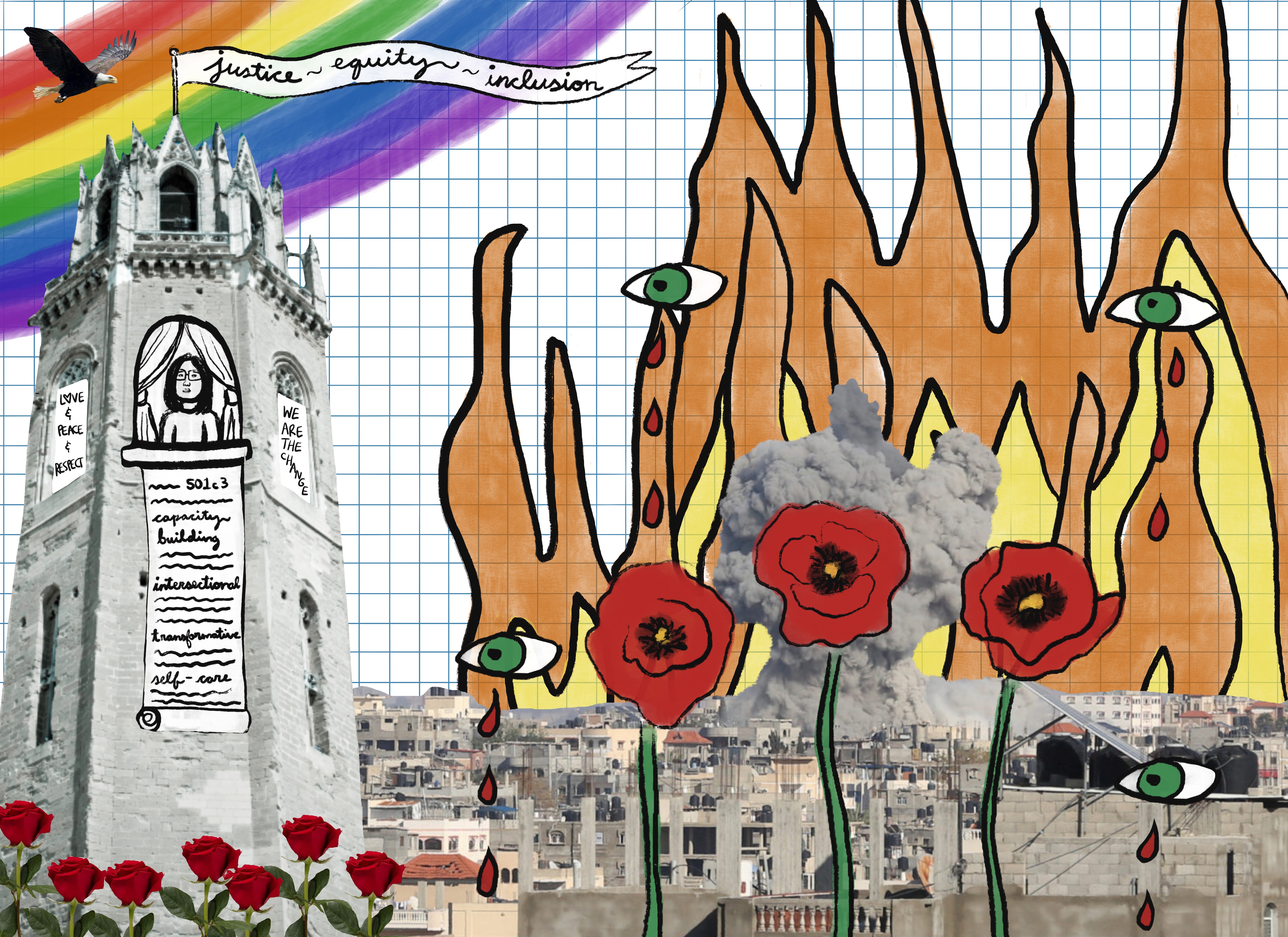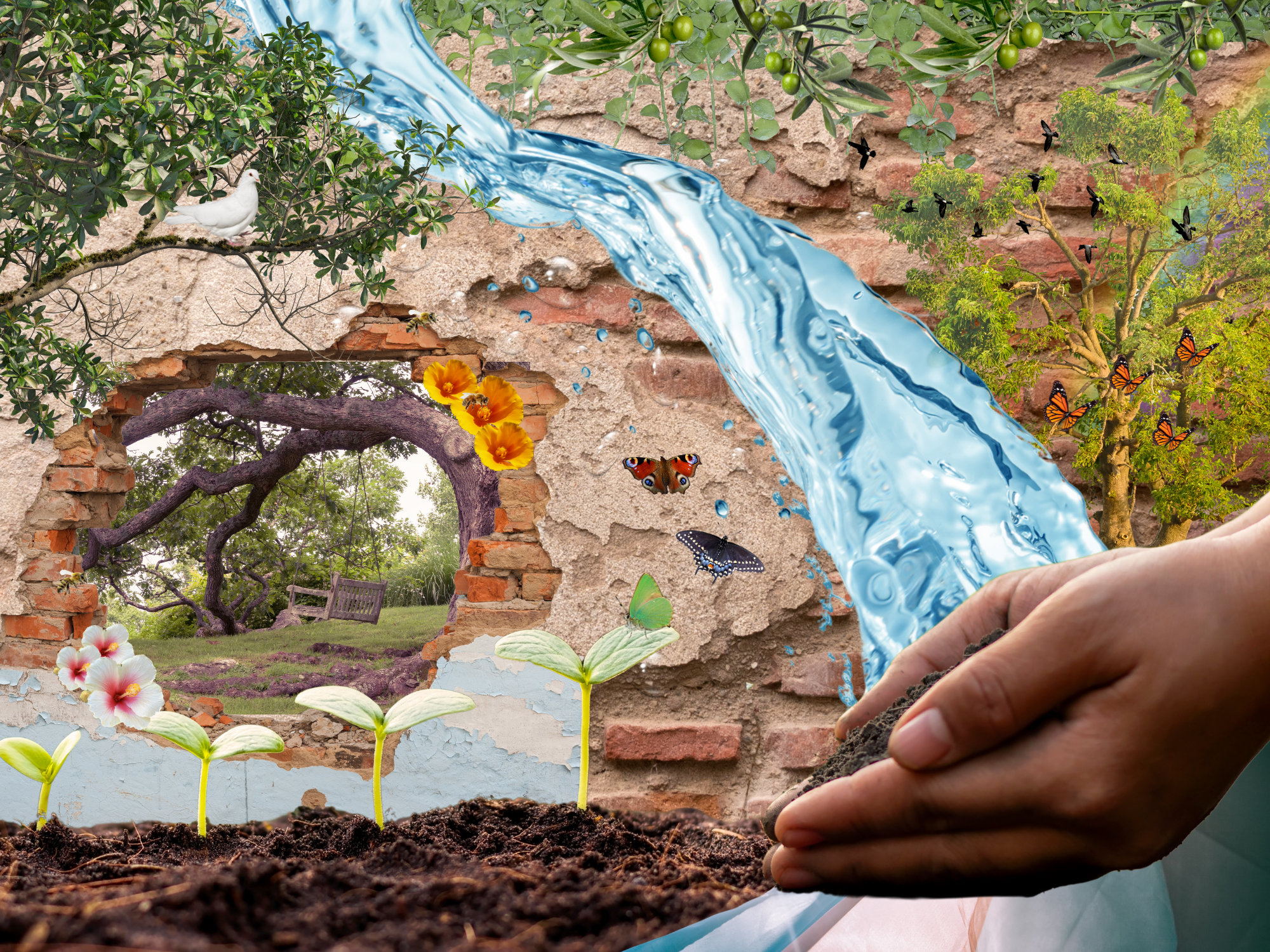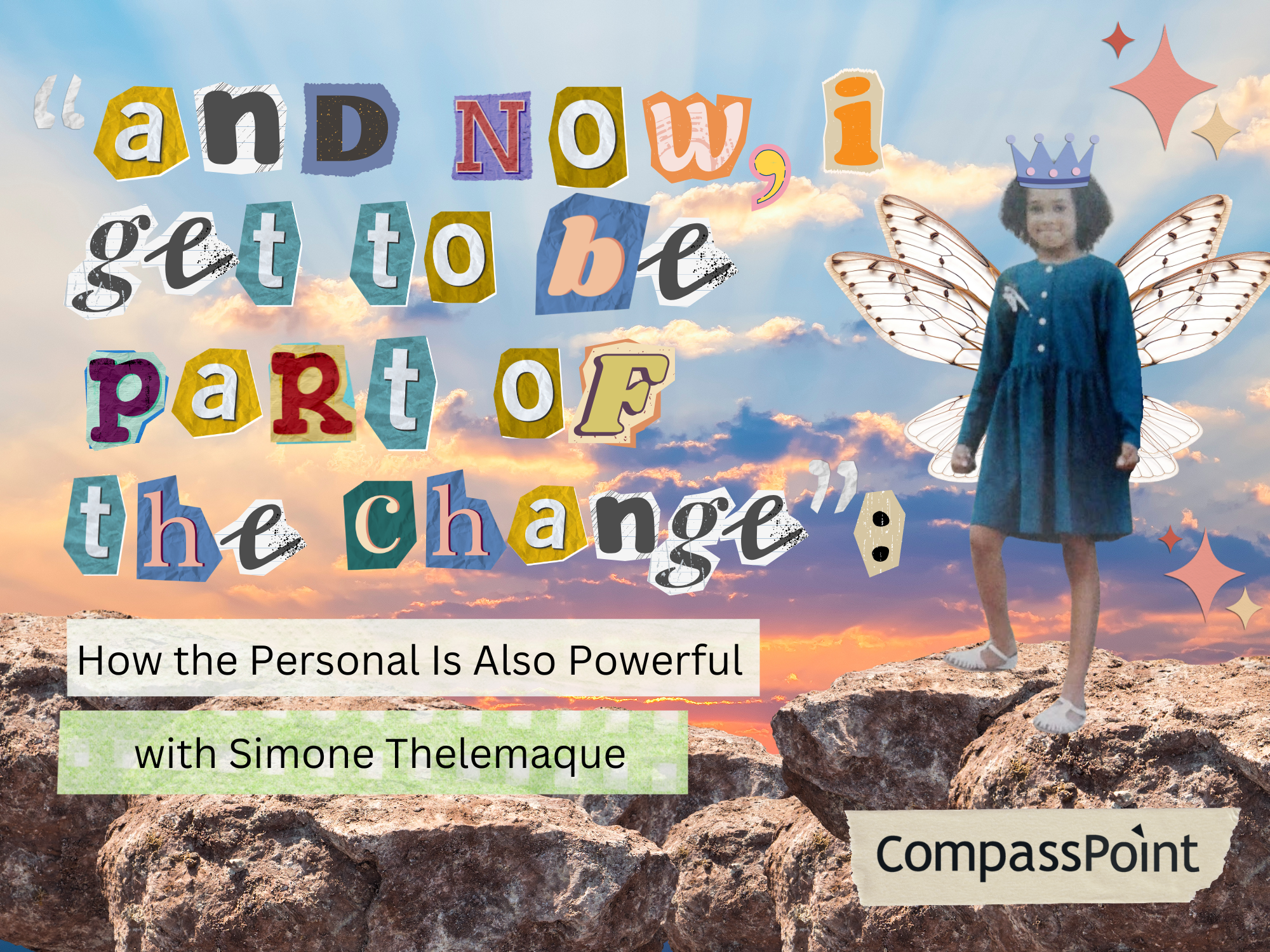[Image description: An art collage made up of photographic and illustrative images, set against blue graph lines, features a person standing at the window of a gray tower and looking out at a city in Palestine being bombed. The tower has social justice slogans and phrases plastered on signs and banners, with red roses in the foreground, plus a rainbow and flying eagle in the background. The city being bombed is foregrounded by three red poppies and four floating, disembodied green eyes staring back at the person, with tears of blood dripping from each eye; flames fan out behind the devastation.]
I’m not even sure how to begin this, or whether I am the “right” person to speak on this. I am certain someone else already has or will say this much better than I will. But my heart stirs me to name out loud the unbearable, jarring, and confounding complexities of navigating the day-to-day life of working at a social justice nonprofit organization while tens of thousands of people are being systematically targeted and killed with the aiding, abetting, and complicity of the country I live in and its most powerful institutions.
Perhaps this routine has also felt familiar to some of you lately:
I check my emails and messages, heart heavy from ingesting images of the mutilated and ashen corpses of Palestinian babies and their families (even stumbling across one graphic photo is enough to haunt me for days, if not weeks).
The team at Adobe lets me know there’s an upcoming webinar I might be interested in.
I attend and tech host Zoom meetings on budgeting and team logistics and unpacking conflict styles and challenging money beliefs, and the incessant, passively-voiced headlines of Israel’s attacks on defenseless hospitals and refugee camps in Gaza buzz in the background of my mind.
I monitor our organization’s social media channels, post about the importance of practicing self-care, read through devastating reports of mass starvation, torture, settler violence, and environmental degradation in occupied Palestine and how all of this has been ongoing for 75 years plus, click out.
A co-worker on Slack posts pictures of their birthday celebration and a comrade on Instagram posts footage of police violence against student protesters peacefully demanding their universities divest from Zionism.
I fill out my timesheet.
Israel decimates tents in “safe zone” Rafah.
I work on this blog post inside my intact apartment within the belly of the beast.
More graphic footage spills onto my social media feed of Palestinian baby corpses.
I create a cute graphic to promote our trainings for the rest of the year.
The mounting death toll ticks, and the blood on our hands is overflowing.
I am numb and furious and overwhelmed and heartbroken and disgusted and guilty and afraid and ashamed; everything, all at once.
My therapist tells me my dysregulation is valid, that my bodymind’s refusal to compartmentalize is a gift. A co-worker tells me, We can’t just focus on Palestine. That’s not our role.
I understand what my co-worker meant on a technical level; CompassPoint, quite literally, is not a Palestinian liberation organization
And yet, I can’t help but wonder, what is our role in all of this? What does it mean to be a social justice leadership development nonprofit organization during a time of genocide? Is staying complicit and complacent really an option?
If Palestine, the moral litmus test of our time (as Jamaican American poet and activist June Jordan once said and Angela Davis has since emphasized), if a liberation struggle that has inspired one of the greatest sustained global mass movements in recent history simply bears no relevance to our work as people who preach about equity and justice and living into our values, then that is a failure and indictment of our work. And it speaks to a deep chasm between the ways in which we look away within the comfort of our white collar 501c3 jobs inside the imperial core, and what is happening on the ground in grassroots frontline movements across the world.
The Revolution Will Not Have A 501c3 Status
CompassPoint released our solidarity statement with Palestine in October of last year. Some commended our courage and expressed gratitude; others criticized and maligned us. Even internally, the statement led to some tension and confusion for our staff around what it means to speak out as a collective: How do we acknowledge and navigate the nuances and differences in thought, knowledge, and analysis while respecting everyone’s dignity and autonomy, even within a community that has broad progressive political alignment? How do we hold space for multiple lived experiences, truths, and trauma responses in moments of crisis while maintaining integrity and commitment to a clear and grounded political stance and praxis? These are questions we are still figuring out as an organization.
I personally stand by our statement, and I wish we had approached the process of getting there differently. Slowing down a little and taking the time to build our political knowledge, plan for digital security, and create greater shared understanding of CompassPoint’s responsibility to speak out in this moment would have paved the way for increased strategic clarity, political alignment, and collective power, I imagine.
Yet, what regret I feel about our process is tempered by the sobering reality that nearing ten months into the genocide, we are now at well over 38,000 Palestinians mass murdered by Israel (not counting thousands more who are buried under rubble or likely killed from systematic starvation, communicable diseases, and structural medical neglect)—with no permanent ceasefire in sight.
In the last few years, I’ve become someone with a healthy dose of disillusionment when it comes to the nonprofit industrial complex. And in the aftermath of the backlash against our statement, I felt even more disconnected from my job. What did social justice nonprofit leadership development even mean? Tiptoeing elegantly around the genocide in the room? Learning how to use words and phrases like “justice” and “centering the most marginalized” while excluding the humanity of Palestinian, Arab, and Muslim peoples from their invocation? Being diverse, equitable, and inclusive about our complicity in the active annihilation of an indigenous people?
If our fight for social justice does not include standing up and speaking out against genocide, we are doing it wrong.
The Power of Community as a Grounding Force
Last November, I was one of the 78 protesters arrested on the Bay Bridge. I was tired of screaming into a virtual void, so I took to the streets, where I found deep kinship with comrades whose hearts blazed as brightly as mine did. Together we called for a permanent ceasefire, an end to all U.S. aid to Israel, and demanded from the river to the sea, Palestine will be free.
As hordes of cops wielding batons in full-on riot gear bore down on us, it occurred to me at that moment that I should be afraid. But the courage of my convictions, and the solidarity I felt from those who surrounded me, anchored me for the eight hours I was detained, then cited and released.
I had no feelings other than rage, frustration, numbness, and wry amusement (as a coping mechanism) about the day’s events until a couple of weeks later, when I heard from a comrade that their community in Palestine wrote to them about our action, and were deeply impacted by what we did. It was then that I broke down crying.
Suddenly things felt more real, and outside my head, and all the more worth it.
I won’t bore you with the tedium of our seven-month long battle with the criminal legal system as we (successfully!) fought off the trumped up charges brought against us by the San Francisco District Attorney, but what I will say is that I have never been more grateful for the power of community, including the people I am proud to call my co-workers at CompassPoint.
Even with all my gripes with the nonprofit as a neoliberal structure, I know I am immensely fortunate and privileged to access the resources I do. I was able to take PTO to participate in the protest, and I was able to feel safe enough to share what I experienced with my colleagues, who were supportive, affirming, and would check in with me as I navigated the aftermath of my arrest. When my fellow arrestees were in need of mutual aid funds to cover hours of work missed, healthcare costs, a housing eviction, childcare expenses, transportation fees, and more, I put on my resource mobilizer hat and asked my co-workers to donate, many who did so without missing a beat. Even through our differences in political analysis, strategy, and tactics, my coworkers trusted me and rooted for me.
As of May, all charges against the Bay Bridge 78 have been officially dropped after we accepted a two-month diversion offer. It was a bittersweet victory, with Gaza still being mercilessly bombed with our tax dollars. To this day and until our demands are met, we call for a permanent ceasefire, an end to all U.S. aid to Israel, and a free Palestine.
Nonprofit Organizations Must Align with People and Movements
What time is it on the clock of the world?
This was a question posed by Chinese American philosopher, Black Power activist, and movement ancestor Grace Lee Boggs. It was an invitation to think about time in the context of the longer arc of history, to view it through a lens of ever-changing revolutionary movements and not just one-off, static rebellions. It’s a question I’ve been thinking about a lot lately as I struggle to manage personal sustainability in the midst of genocide, late stage capitalist crises, organizational transitions, health issues, relationship ruptures, and family obligations. I don’t want to burn out. Social justice is not a trend or a paycheck to me; it is a lifelong commitment and embodied political praxis.
While this moment feels painful and urgent and fraught, Boggs’ guiding question helps me to tap into radical hope and imagination. There is a future in which Palestinians and all oppressed peoples across the globe will be free from the chains of imperialism, capitalism, and colonialism. It feels far and yet on the clock of the world, it is close. I believe that we will win.
As cynical as I am about nonprofits, there’s a reason I’ve chosen to work in the nonprofit sector for the entirety of my career thus far. On my better days, I still believe nonprofits can be used as vessels for social change. But we have to ensure that our vision, mission, values, and services are in alignment with people and movements, not siloed by and beholden to armchair experts, reactionary stakeholders, and empty jargon.
I am grateful that during a time of multiple crises, I get to work at a place like CompassPoint. While certainly imperfect, our organization has given me some space to wrestle with my anxieties and dissonance around being authentically myself, versus conforming to organizational norms and dominant culture; living into my values, versus protecting the organization’s bottom line; agitating out in the streets for abolition and decolonization, versus creating carefully curated talking points at my cushy desk job.
To my pleasant surprise, not all of these are binaries, and there have been beautiful moments of synchronicity in which my organization and I have met in the middle. A huge part of that is an organizational culture that prioritizes its people, invests in distributed leadership and shifting power, is willing to stretch outside its comfort zone, and is adaptive to changing conditions.
Truth be told, I don’t know if I’ll ever feel comfortable straddling the line between insular white collar nonprofit work and the material struggles of people with boots on their necks far heavier than the one on mine. But if there’s one thing I’ve learned over the course of my journey of political and personal growth, it’s that discomfort is an invitation for great change and transformation. The chasm between the nonprofit ivory tower and people in the streets may feel vast to me, and I must remind myself there are (and have been, and will be) changemakers who sought ways to bridge that divide—not in an effort to reform or replicate oppressive power structures, but in service of real liberation that is tangible to multiply-marginalized communities.
With this in mind, I am committed to working towards a vision in which all nonprofit workers (particularly those who come from the margins) are able to access the spaces, relationships, and resources they need to feel seen and heard, to step into power and leadership in ways that align with their liberatory politics, and to push for a sector that can unapologetically speak out and stand up against genocide and settler-colonial apartheid states without flinching or backpedaling—because the closer we get to living and working in alignment with our values, the closer we are to collectively getting free.
Things to Do If You Haven’t Been Doing Them Already:
- Donate to crowdfunding campaigns for Palestinians from Gaza who are trying to survive, evacuate, or resettle after displacement.
- Connect with Arab Resource Organizing Center (AROC—Bay Area-based), Palestinian Youth Movement (PYM), and Jewish Voice for Peace (JVP) to get plugged into upcoming Palestine solidarity actions.
- Learn more about the BDS movement and how you can boycott and divest from companies complicit in Israeli occupation, colonialism, apartheid, and genocide.
- Donate to mutual aid funds that directly and materially support pro-Palestine frontline organizers and activists. (Updated 7/31/25: Highlighting the Free Casey Now campaign! Casey is a beloved community organizer, abolitionist, and current US political prisoner who was unjustly incarcerated from the 2024 pro-Palestine student encampments. Support their legal defense, write to them in solidarity, and send mutual aid funds to them!)
- Leverage whatever power and privileges you have at your disposal to raise awareness and mobilize people/resources for Palestine. Examples: I work in comms at a leadership development organization and wrote this blog post using my organization as a platform. I am an amateur illustrator and donated some of my art prints to support pro-Palestine humanitarian aid and legal advocacy efforts. Everyone has something they can offer in service of the movement.
- Tap in with your communities, pod people, and comrades for connection, support, political education, security practices, and care as you navigate the risks of standing up for liberation that threatens the U.S. war machine. No one is coming to save us; all we have is each other. I/you cannot do this alone. We take care of us!






Submit a comment